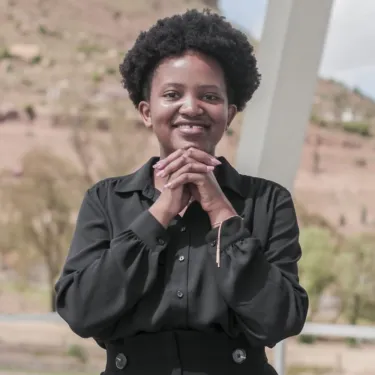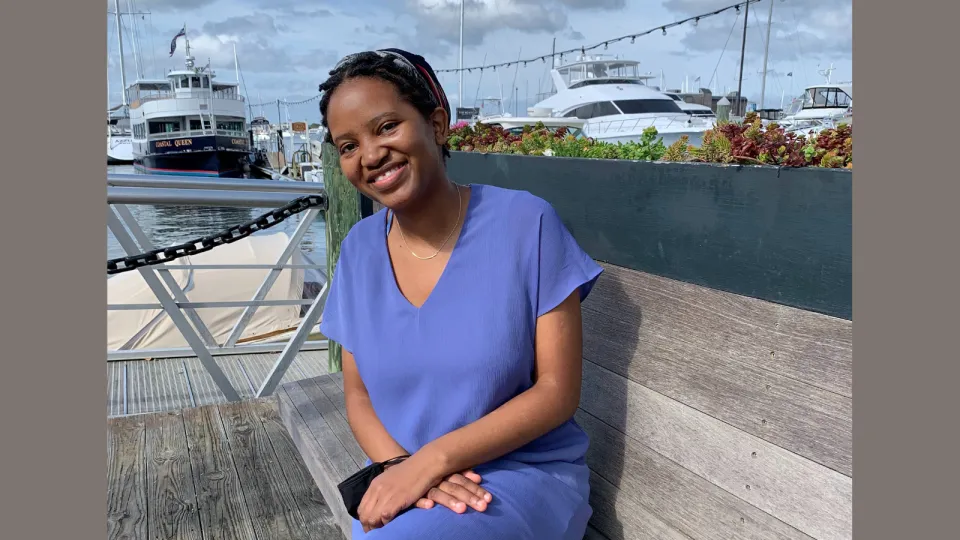Matlhabeli Molaoli ’22
Meet the Majors

Other clubs, sports, activities:
Smith Startup Consulting Group, Smith Christian Fellowship, Design Immersion Fellow 2019, House Community Advisor 2019-21, Kahn Liberal Arts Institute Fellow 2022.
What’s your “Big Dream” for your future?
I want to be a good person, do work that makes the world better and be happy. In that order. I’m not too committed to a single vision of what that “Big Dream” could look like, especially in my career. I can easily see myself fulfilled and challenged doing academic research in African women’s work or helping design teams deeply understand the consumers they want to serve. It’s such a luxury to choose career paths that resonate with my values and would allow me to do work I find exciting and meaningful. This is the beauty of a liberal arts education, I think; that students are encouraged and equipped to imagine different professional possibilities.
It’s such a luxury to choose career paths that resonate with my values and would allow me to do work I find exciting and meaningful. This is the beauty of a liberal arts education.
Describe your major for someone who has never heard of your field before.
This is an ongoing conversation within the discipline because anthropology is as broad as it is deep. At the simplest level, anthropology is the study of culture. Anthropologists want to deeply understand the human experience by studying cultural and biological variation across space and time: what things matter to whom and why? The US tradition segments the discipline into four: linguistic, physical, and sociocultural anthropology, and archaeology. So really, nothing is off-topic for anthropology! I’m most excited by emerging definitions that recast anthropology as a genre of Black Study because these broaden the method and scope of the discipline.
What was one thing that surprised you most about your major?
The incredible variety of questions that anthropology can help us ask and answer! Over the past three years, I’ve enjoyed readings about everything from the formation of the modern nation-state to global health in the Global South, to tourism in Brazil, to the legalization of cannabis in the U.S. I was also pleasantly surprised by how useful anthropological methods are outside academia, especially in the worlds of user-centered design and research. As a lens and disposition, anthropology can offer incredible insight wherever we need to understand and value difference, whether to inform product design or public health interventions.
Anthropology can offer incredible insight wherever we need to understand and value difference, whether to inform product design or public health interventions.
How did you choose your second major and how does it complement your first?
I knew I wanted a STEM degree before I came to Smith, so I started the biochemistry track pretty early on. It wasn’t until the end of my first year that I realized I was craving something else in my education trajectory. I chatted with Dr. Colin Hoag—my then-liberal arts advisor—about this, thinking I might take a sociology or public policy class the next year. He suggested I try an anthropology class (with some bias, admittedly) and I did. I knew pretty much in that first introductory class that I’d major in anthropology, maybe even commit to it as a career path—it was a very special and tender moment, almost spiritual even. I’ve found anthropology to be attentive to the human condition and unafraid of complexity, just as Dr. Hoag had described it three years ago. Although I haven’t created many opportunities for my two majors to coincide meaningfully—except maybe in defining each other through contrast—I’ve been deeply formed by them both in ways that can only serve my personal and professional life after Smith.
Did you ever have trouble deciding on a major? What, ultimately, helped you decide?
I couldn't decide between biological sciences and chemistry in my first year so I committed to biochemistry because it made sense to my interdisciplinary proclivities. My main tensions with anthropology have been with its colonial roots and ongoing marginalization of Black (especially African) scholarship in the discipline. I’m so lucky that Smith offers a number of classes that introduced me to Black Feminist Anthropology because they helped me imagine my way through the discipline, despite its tenuous past.
I’m so lucky that Smith offers a number of classes that introduced me to Black Feminist Anthropology because they helped me imagine my way through the discipline, despite its tenuous past.
Describe one moment with a professor that particularly sticks out to you.
Oh my goodness, just one? I remember going to Dr. Pinky Hota’s office for the first time when I took Intro with her. We talked about the discipline, how she came to be anthropologist and she introduced me to a few Black Africanists in anthropology. It was an important moment because I felt seen and understood. There are so many others: I remember talking about biochemistry research on a walk with Dr. Lesly-Ann Giddings; I also got to read "Give a Man a Fish" with Dr. Hoag outside class, and Emily Norton has suggested a wonderful reading list on the intersections of anthropology and critical design.
What spot on campus will you miss the most? Where was your favorite place to catch a bite to eat?
I’ll miss the pond so much! Some of my favorite moments at Smith have been spent taking unhurried, meandering walks around Paradise or sitting by the boathouse in the warmer seasons.
I can’t tell you how much I love fried plantains! So, whichever dining hall serves some instantly wins “Favorite Place to Catch a Bite” for the day!
If you could tell an incoming first-year anything about Smith, what would it be?
There are so many different paths through Smith, you will definitely find your own! You have your own sense of self to guide you, the wisdom and stories of your “elders” to learn from, plus communities to make and find. I’m rooting for you, and praying you’ll recognize everyone cheering you on, walking beside you. I hope that when you leave, Smith was meaningful and rewarding.
What do you think has been the most “Smithie” thing you’ve done in life so far?
I had the cliché Smith chop my junior year! I’d balked at the tradition, but when junior year rolled around, I felt a sudden sense of peace about cutting my hair, although the pandemic probably had a little something to do with it.
